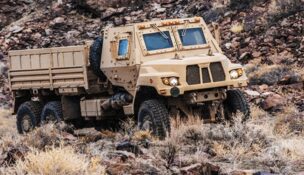CU-ICAR to house Army autonomous vehicle research center
Staff Report //December 16, 2020//
 U.S. Army autonomous vehicle research and an $18 million federal grant will drive the development of a Virtual Prototyping of Ground System Center at the Clemson University International Center for Automotive Research.
U.S. Army autonomous vehicle research and an $18 million federal grant will drive the development of a Virtual Prototyping of Ground System Center at the Clemson University International Center for Automotive Research.
The center will serve as an impetus for research on how virtual prototyping can be used to develop modified Bradley Fighting Vehicles and robotic combat vehicles for joint manned and unmanned combat teams, according to a news release. Zoran Filipi, founding director of the Virtual Prototyping of Ground System Center, will lead more than 65 Clemson faculty from seven engineering departments in partnership with the U.S. Army Ground Vehicles Systems Center in the creation of virtual prototyping tools.
“The VIPR Center will be an essential part of a Ground Vehicle Modeling and Simulation Alliance that GVSC will rely on as it leads the U.S. Army in the integration of new capabilities into military ground vehicles,” David Gorsich, chief scientist of U.S. GVSC, said in the release.
Research will revolve around digital engineering, next-generation propulsion and energy systems, as well as manned and unmanned teaming in off-road environments.
“For the last decade, we have diligently strengthened and expanded our capabilities to become the nationally-recognized institution we are today,” Zoran Filipi, chair of the department of automotive engineering and founding director of the VIPR-GS Center, said in the release. “From our skilled autonomous vehicle research team to our unmatched expertise in advanced propulsion and systems engineering DNA, this is exactly the type of high-impact, multi-disciplinary, ambitious research challenge we were built for.”
Clemson’s main campus will also house some research activities, opening the door to additional student learning opportunities.
“Autonomous systems and connected vehicles are some of the most significant factors shaping the mobility industry today, and the work being done in off-road autonomy is truly the next frontier,” Clemson University President Jim Clements said in the news release. “CU-ICAR was designed to foster research and partnerships to benefit our future. Through our deep research strengths and interdisciplinary culture, Clemson is uniquely positioned to lead the way in this important work.”
o















